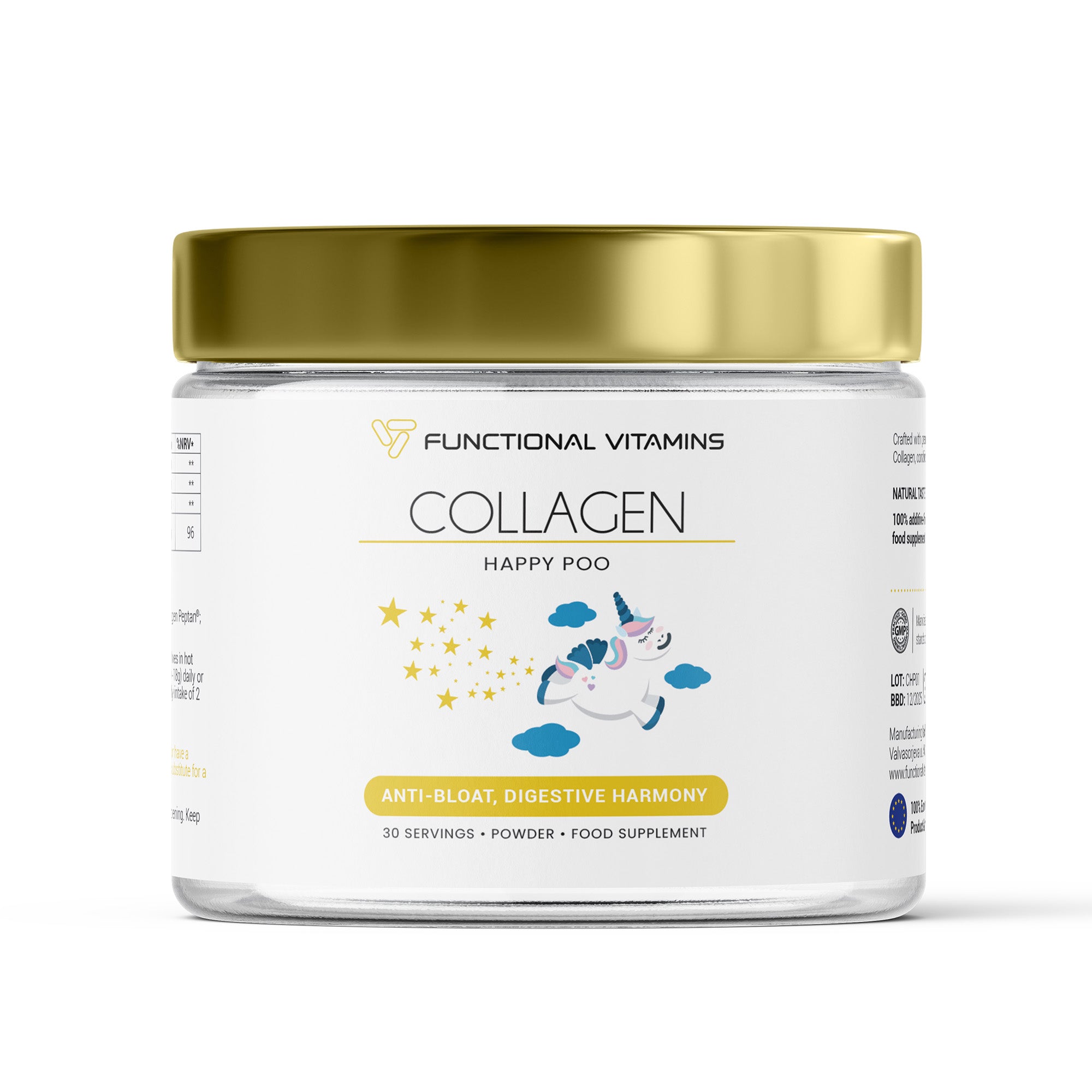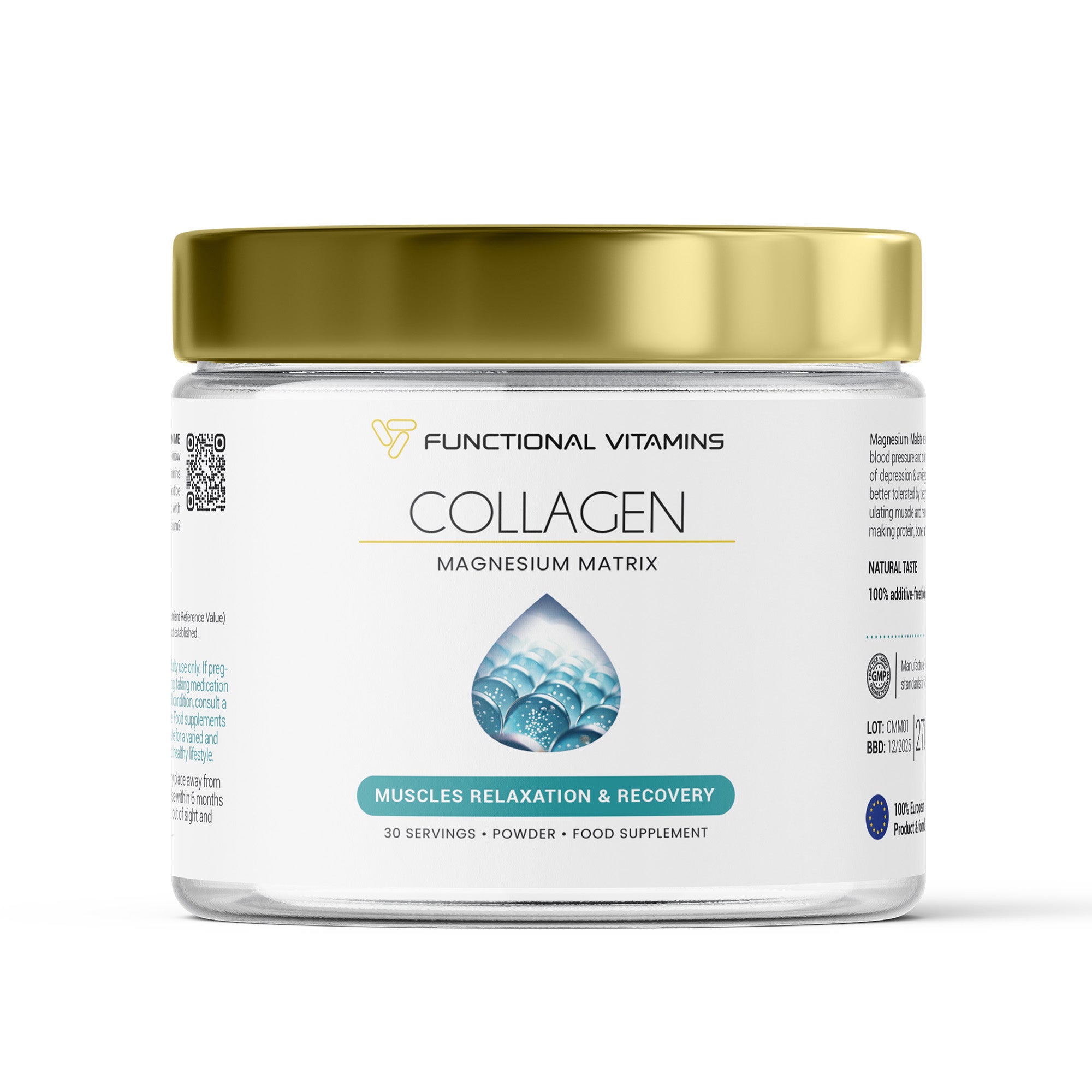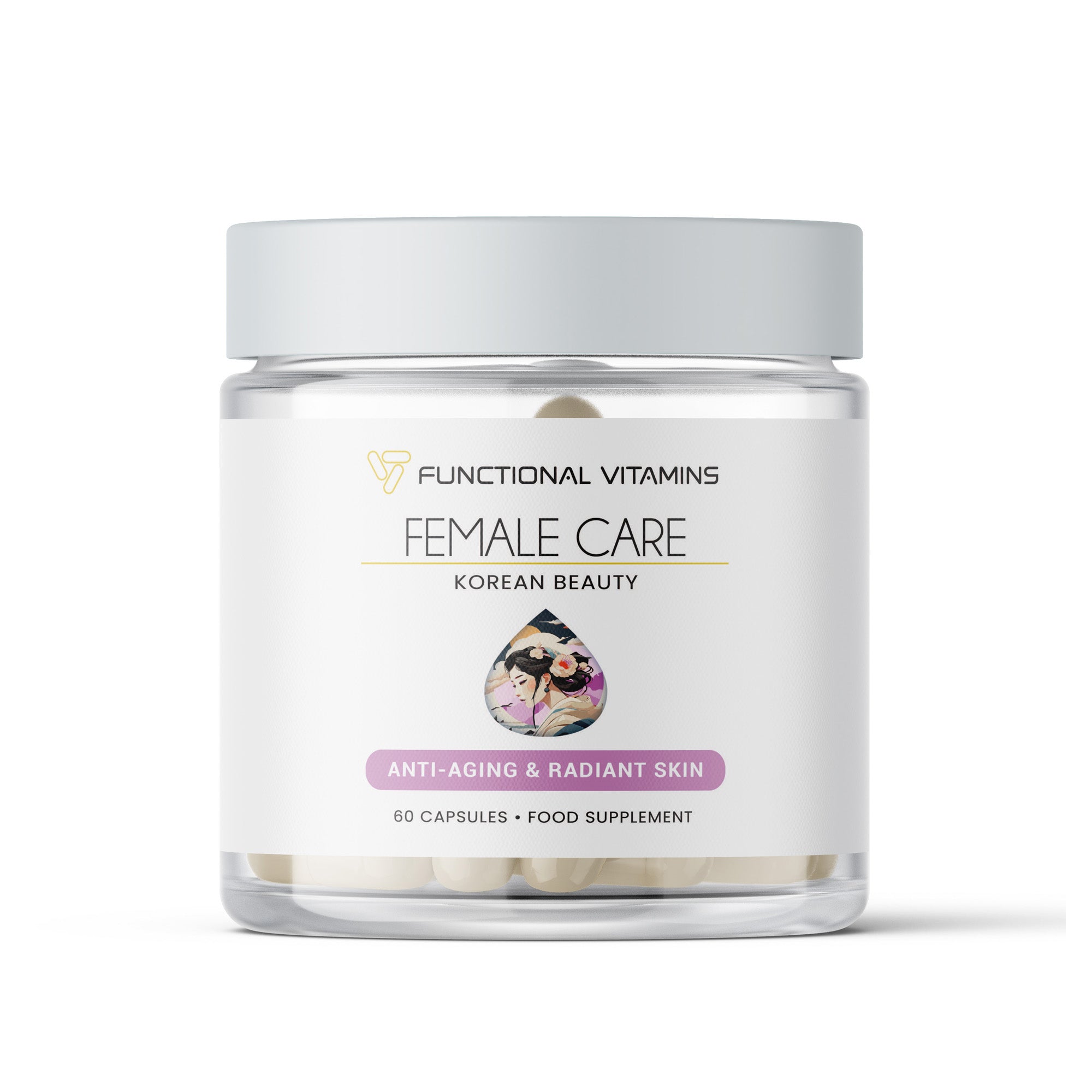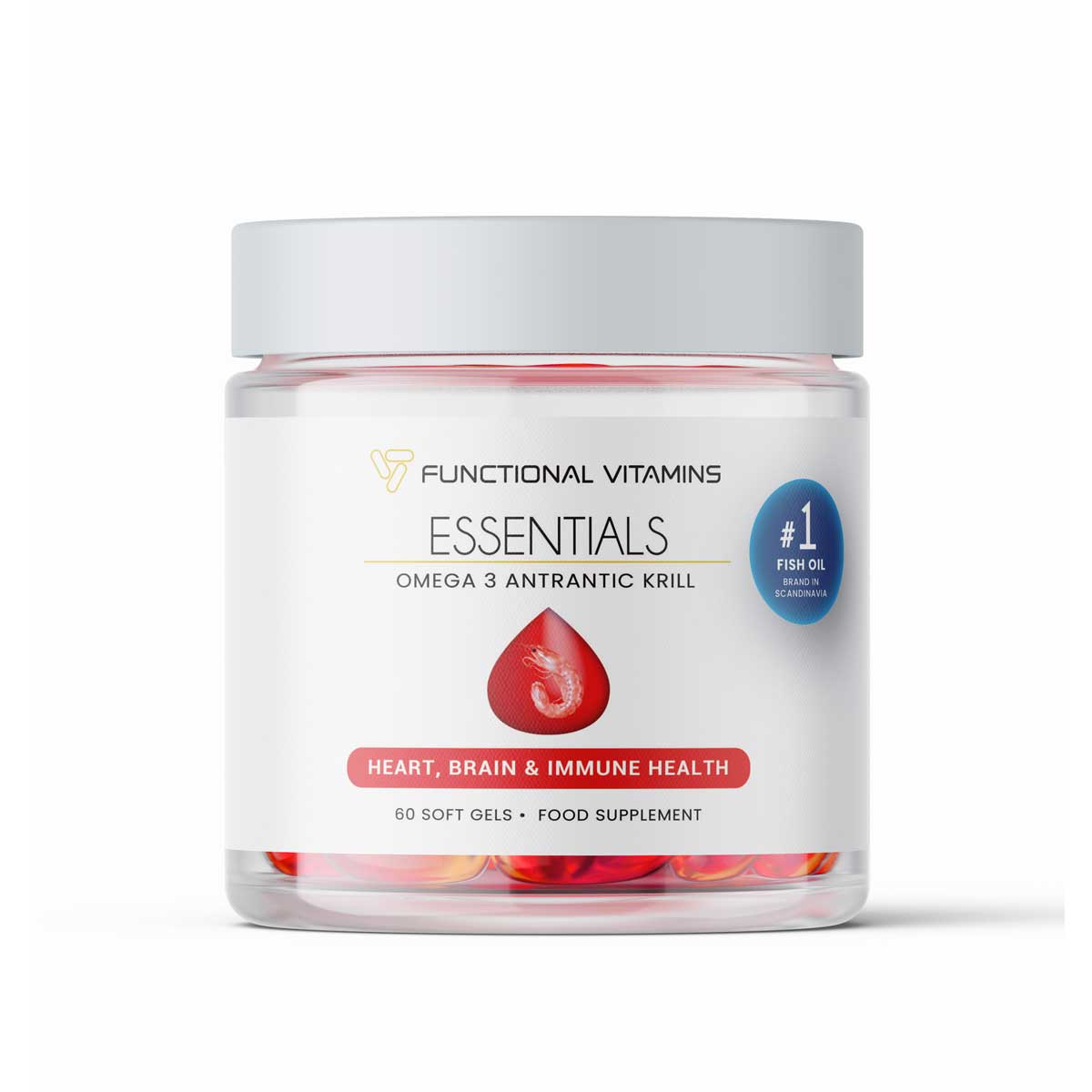A Comprehensive Manual for Optimal Well-Being and Digestive Balance
In today's fast-paced world, achieving optimal health and digestive harmony is more crucial than ever. Enter Happy Poo™ Collagen—a groundbreaking blend of Psyllium Husk and Collagen designed to revolutionize your well-being journey. Let's dive into why Psyllium seed husks are the game-changer you've been waiting for.
Why Psyllium Seed Husks? A Closer Look
Psyllium seed husks are the outer coverings of the seeds from the Plantago ovata plant, commonly known as blond or Indian psyllium. These tiny, reddish-brown husks are a rich source of soluble fiber and have gained popularity as a dietary supplement due to their potential health benefits.
Nutritional Profile
Psyllium husks are primarily composed of soluble fiber, including substances known as mucilage. This fiber content is what gives psyllium its unique properties and benefits.
Health Benefits of Psyllium
Digestive Health
Constipation Relief: One of the most well-known uses of psyllium husks is as a natural laxative. The soluble fiber absorbs water in the gut, forming a gel-like substance that softens stools and promotes regular bowel movements.
Heart Health
Cholesterol Management: Some studies suggest that psyllium husks can help lower LDL cholesterol levels, thereby reducing the risk of heart disease.
Blood Sugar Control
Diabetes Management: The soluble fiber in psyllium husks can slow the absorption of sugar, potentially aiding in blood sugar regulation for individuals with diabetes.
Weight Management
Appetite Control: Due to its ability to expand in the stomach, psyllium husk fiber may help increase feelings of fullness and reduce overall calorie intake, supporting weight loss efforts.
Forms and Usage
Psyllium husks are commonly available in powder, capsule, and wafer forms. They can be mixed with water or other liquids and consumed as a drink, or added to foods like yogurt or oatmeal. It's crucial to follow the recommended dosage and drink plenty of water when consuming psyllium husks to avoid potential side effects like bloating or intestinal discomfort.
The table below serves as a quick reference guide for understanding how psyllium husks can be used to address various health conditions. 
Happy Poo™ Collagen: The Ultimate Wellness Elixir
Combining natural Psyllium Husk, Naticol® Collagen Marine, Peptan® Collagen Bovine, and Magnesium Malate can create a comprehensive supplement blend that addresses various aspects of health, from digestive well-being to skin health and energy production.
Here's a breakdown of why this combination may offer synergistic benefits:
DIGESTIVE HEALTH
Fiber and Gut Health: Psyllium husk provides soluble fiber that supports digestive function, aids in regular bowel movements, and may alleviate symptoms of gastrointestinal disorders like IBS and Diverticular Disease.
Collagen for Gut Lining: Marine and bovine collagen peptides can help maintain the integrity of the gut lining, potentially reducing gut permeability and supporting a healthier microbiome.
Magnesium for Bowel Regularity: Magnesium malate is a form of magnesium that may support bowel regularity and overall digestive comfort.
SKIN AND CONNECTIVE TISSUE
Collagen Synthesis: Both marine and bovine collagen provide essential amino acids that support the body's natural collagen production, contributing to skin elasticity, hydration, and overall appearance.
Wound Healing: Collagen is known for its role in wound healing, and the combination of marine and bovine sources may offer a broader range of beneficial amino acids for this purpose.
Antioxidant Protection: Magnesium malate, along with collagen, may offer antioxidant benefits that protect the skin from oxidative stress and premature aging.
ENERGY AND MUSCLE FUNCTION
Magnesium for Energy: Magnesium is essential for ATP production, the primary energy currency of the cell. Magnesium malate specifically may support energy production pathways, potentially reducing fatigue and muscle cramps.
Collagen for Muscle Health: Collagen is a component of tendons, ligaments, and muscles. Supplementing with collagen may support muscle repair and maintenance.
Unveiling Digestive Harmony with Happy Poo™ Collagen
The combination of psyllium husk, marine collagen, bovine collagen, and magnesium malate offers a comprehensive approach to health, targeting digestive wellness, skin health, and energy production.
Whether you're seeking relief from chronic conditions like constipation or aiming to enhance your overall wellness, Happy Poo™ Collagen offers a synergistic blend of Psyllium and Collagen to support your unique health goals. Don't miss out on this transformative wellness elixir. Embrace a vibrant, balanced lifestyle with Happy Poo™ Collagen—the future of optimal health and digestive harmony.
Clinical Studies
Naticol® Collagen Marine
Shoulders, M. (2009), Annu Rev Biochem., 78:929-58.
Iwai, K. (2005), J Agric Food Chem., 53(16):6531-6.
Peptan® Collagen Bovine
Postlethwaite, A. E., et al., 1978. Chemotactic attraction of human fibroblasts to type I, II, and III collagens and collagen-derived peptides. Proceedings of the National Academy of Sciences, 75(2), 871-875. doi:10.1073/pnas.75.2.871
Gniadecka, M., 1998. Water and protein structure in photoaged and chronically aged skin. Journal of the European Academy of Dermatology and Venereology, 11. doi:10.1016/s0926-9959(98)95059-0
Asserin, J. et al., 2015. The effect of oral collagen peptide supplementation on skin moisture and the dermal collagen network: evidence from an ex vivo model and randomized, placebo-controlled clinical trials. Journal of Cosmetic Dermatology, doi: 10.1111/jocd.12174
Guillerminet, F. et al., 2010, Hydrolyzed collagen improves bone metabolism and biomechanical parameters in ovariectomized mice: An in vitro and in vivo study. Bone, 46:827-834
Guillerminet, F. et al., 2012, Hydrolyzed collagen improves bone status and prevents bone loss in ovariectomized C3H/HeN mice. Osteoporosis International, 23(7):1909-1919
Daneault, A. et al., 2014, Hydrolyzed collagen contributes to osteoblast differentiation in vitro and subsequent bone health in vivo. Osteoarthritis and Cartilage, 22:S131.
Daneault, A. et al., 2017, Biological effect of hydrolyzed collagen on bone metabolism. Critical Reviews in Food Science and Nutrition, 57(9):1922-1937.
Hays N.P. et al., 2009, Effects of whey and fortified collagen hydrolysate protein supplements on nitrogen balance and body composition in older women. Journal of the American Dietetic Association, 109:1082-1087.
Jiang J.X. et al., 2014, Collagen peptides improve knee osteoarthritis in elderly women: A 6-month randomized, double-blind, placebo-controlled study. Agro FOOD Industry Hi Tech 25: 19-23.
Dar, Q. et al., 2017. Daily oral consumption of hydrolyzed type 1 collagen is chondroprotective and anti-inflammatory in murine posttraumatic osteoarthritis. PLoS ONE 12(4):e0174705.
Jiang J.X. et al., 2014, Collagen peptides improve knee osteoarthritis in elderly women: A 6-month randomized, double-blind, placebo-controlled study. Agro FOOD Industry Hi Tech, 25:19-26.
Psyllium seed husks
Brum a, Roger D. Gibb a, John C. Peters b, Richard D. Mattes c. 2016. Satiety effects of psyllium in healthy volunteers. Volume 105, 1 October 2016, Pages 27-36.
https://www.sciencedirect.com/science/article/pii/S0195666316301738
Wärnberg, Julia CSIC ORCID; Marcos, Ascensión CSIC ORCID; Bueno, G.; Moreno, Luis A. 2009. Functional benefits of psyllium fiber supplementation. New Century Health Publishers. Nutraceutical Research 7: 55- 64. https://digital.csic.es/handle/10261/82891
MURPHY, Joseph et al. 2015. Testing control of radiationinduced diarrhea with a psyllium bulking agent: A pilot study. Canadian Oncology Nursing Journal, v. 10, n. 3, p. 96-100, May. 2015. ISSN 2368-8076. Available at: https://canadianoncologynursingjournal.com/index.php/conj/article/view/441
Barbara H.D Luccia PhD, M. Elizabeth Kunkel. 2002. Psyllium reduces relative calcium bioavailability and induces negative changes in bone composition in weanling Wistar rats. Nutrition Research. Volume 22, Issue 9, September 2002, Pages 1027-1040.
https://www.sciencedirect.com/science/article/abs/pii/S0271531702004086
McRorie, Johnson W. Jr, Gibb, Roger D.; Sloan, Kyle J.; McKeown, Nicola M. 2021. The Gel-Forming Nonfermented Isolated Fiber That Delivers Multiple Fiber-Related Health Benefits. Nutrition Today 56(4):p 169-182, 7/8 2021.
Jalanka, J.; Major, G.; Murray, K.; Singh, G.; Nowak, A.; Kurtz, C.; Silos-Santiago, I.; Johnston, J.M.; de Vos, W.M.; Spiller, R. The Effect of Psyllium Husk on Intestinal Microbiota in Constipated Patients and Healthy Controls. Int. J. Mol. Sci. 2019, 20, 433. https://www.mdpi.com/1422-0067/20/2/433
Brum MD, David Ramsey MS, Johnson McRorie PhD, Brent Bauer MD, Stephen Louis Kopecky MD. 2018. The American Journal of Cardiology. Volume 122, Issue 7, 1 October 2018, Pages 1169-1174.
https://www.sciencedirect.com/science/article/abs/pii/S0002914918313328
Baljit Singh. 2007. Psyllium as therapeutic and drug delivery agent. International Journal of Pharmaceutics. Volume 334, Issues 1–2, 4 April 2007, Pages 1-14
https://www.sciencedirect.com/science/article/abs/pii/S0378517307000610
Kelle V. Lambeau DNP, APRN, FNP-BC, Johnson W. McRorie Jr. PhD, FACG, AGAF, FACN. 2017. Fiber supplements and clinically proven health benefits: How to recognize and recommend an effective fiber therapy. Volume29, Issue4. April 2017. Pages 216-223.
https://onlinelibrary.wiley.com/doi/full/10.1002/2327-6924.12447
McRorie, Johnson W. Jr PhD, FACG, AGAF, FACN; Gibb, Roger D. PhD; Womack, Joyce B. AS; Pambianco, Daniel J. MD, FACG, FASGE. 2017. Psyllium Is Superior to Wheat Dextrin for Lowering Elevated Serum Cholesterol. Nutrition Today 52(6):p 289-294, 11/12 2017.
Barbara H.D Luccia, Mary E Kunkel. 2002. In vitro availability of calcium from sources of cellulose, methylcellulose, and psyllium. Food Chemistry. Volume 77, Issue 2, May 2002, Pages 139-146.
https://www.sciencedirect.com/science/article/abs/pii/S0308814601001686
Clark CCT, Salek M, Aghabagheri E, Jafarnejad S. 2020. The effect of psyllium supplementation on blood pressure: a systematic review and meta-analysis of randomized controlled trials. Korean J Intern Med. 2020 Nov;35(6):1385-1399. https://www.ncbi.nlm.nih.gov/pmc/articles/PMC7652639/
Zeinab Gholami, Zamzam Paknahad. 2023. Effect of psyllium consumption on metabolic syndrome indices: Systematic review and dose–response meta-analysis of randomized controlled trials. Journal of Functional Foods. Volume 107, August 2023, 105685.
https://www.sciencedirect.com/science/article/pii/S1756464623002852
Magnesium Malate
Marta R. et al. 2021. Bioavailability of magnesium food supplements: A systematic review. Nutrition. Volume 89, September 2021, 111294.
https://www.sciencedirect.com/science/article/abs/pii/S0899900721001568
Nazan Uysal, et- al. 2019. Timeline (Bioavailability) of Magnesium Compounds in Hours: Which Magnesium Compound Works Best? Springer. 2018. Volume 187, pages 128–136, (2019).
https://link.springer.com/article/10.1007/s12011-018-1351-9
Remi Fritzen, et al. 2023. Magnesium Deficiency and Cardiometabolic Disease. Nutrients 2023, 15(10), 2355.
https://www.mdpi.com/2072-6643/15/10/2355
Mellitus Richard Evers Katholi, Marcella Rene Ervin Prairie. 2023. Metabolic and Renal Protective Benefits of Magnesium Supplementation in the Long-Term Management of Patients with Type 2 Diabetes. Journal of Diabetes Mellitus. Vol.13 No.2. https://www.scirp.org/journal/paperinformation?paperid=124800
Lei Fan, et al. 2022. Ca:Mg ratio, medium-chain fatty acids, and the gut microbiome. Clinical Nutrition. Volume 41, Issue 11, November 2022, Pages 2490-2499.
https://www.sciencedirect.com/science/article/abs/pii/S0261561422003259
Franziska Bürkle, et al. 2021. New perspectives for investigating muscular perfusion response after dietary supplement intake: an exploratory, randomized, double-blind, placebo-controlled crossover trial in healthy young athletes using contrast-enhanced ultrasound (CEUS). Journal of the International Society of Sports Nutrition. Volume 19, 2022 - Issue 1. Pages 397-416.
https://www.tandfonline.com/doi/full/10.1080/15502783.2022.2097018
Lippi, L., Uberti, F., Folli, A. et al. 2022. Impact of nutraceuticals and dietary supplements on mitochondria modifications in healthy aging: a systematic review of randomized controlled trials. Aging Clin Exp Res 34, 2659–2674 (2022). https://doi.org/10.1007/s40520-022-02203-y
Kumar, N., Thorat, S.T., Patole, P.B. et al. Protective role of selenium and selenium-nanoparticles against multiple stresses in Pangasianodon hypophthalmus. Fish Physiol Biochem (2023). https://doi.org/10.1007/s10695-023-01231-3
Derek R. Case, Jon Zubieta, Ren Gonzalez, Robert P. Doyle, Synthesis and Chemical and Biological Evaluation of a Glycine Tripeptide Chelate of Magnesium, Molecules, 10.3390/molecules26092419, 26, 9, (2419), (2021). https://efsa.onlinelibrary.wiley.com/doi/full/10.2903/j.efsa.2018.5292
Decker Weiss , Debra K. Brunk & Dennis A. Goodman (2018) Scottsdale Magnesium Study: Absorption, Cellular Uptake, and Clinical Effectiveness of a Timed-Release Magnesium Supplement in a Standard Adult Clinical Population, Journal of the American College of Nutrition, 37:4, 316-327, https://www.tandfonline.com/doi/full/10.1080/07315724.2017.1398686
Luisa E. Basso, Johan B. Ubbink, Rhena Delport. 2000. Erythrocyte magnesium concentration as an index of magnesium status: a perspective from a magnesium supplementation study. Clinica Chimica Acta. Volume 291, Issue 1, 20 January 2000, Pages 1-8.
https://www.sciencedirect.com/science/article/abs/pii/S0009898199001680
Ates, M., Kizildag, S., Yuksel, O. et al. 2019. Dose-Dependent Absorption Profile of Different Magnesium Compounds. Biol Trace Elem Res 192, 244–251 (2019). https://doi.org/10.1007/s12011-019-01663-0
Rebecca Costello, Andrea Rosanoff, Forrest Nielsen, Christina West. 2023. Perspective: Call for Re-evaluation of the Tolerable Upper Intake Level for Magnesium Supplementation in Adults. Advances in Nutrition. Volume 14, Issue 5, September 2023, Pages 973-982.
https://www.sciencedirect.com/science/article/pii/S2161831323013352
Neil Bernard Boyle,Clare Lawton and Louise Dye. 2017. The Effects of Magnesium Supplementation on Subjective Anxiety and Stress—A Systematic Review. School of Psychology, University of Leeds, Leeds LS2 9JT, UK. Nutrients 2017, 9(5), 429.
https://www.mdpi.com/2072-6643/9/5/429?ref=circle-magazine-health-wellness-genetics-blog












Leave a comment
This site is protected by hCaptcha and the hCaptcha Privacy Policy and Terms of Service apply.